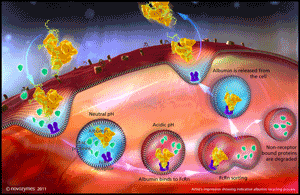Novozymes Biopharma collaborates with the University of Oslo to develop enhanced albumin fusion technology
Posted: 5 May 2011 | | No comments yet
Novozymes Biopharma, unveiled its enhanced next-generation albumin technology…


The albumin recycling process - Albufuse Flex next-generation technology has been developed to tailor the half-life of proteins.
Novozymes Biopharma, part of Novozymes A/S, the world leader in bioinnovation, today unveiled its enhanced next-generation albumin technology, which was developed in collaboration with the University of Oslo, Norway, one of the world’s leading institutions in the research of albumin variants and the neonatal Fc receptor (FcRn).


The albumin recycling process - Albufuse Flex next-generation technology has been developed to tailor the half-life of proteins.
Built on Novozymes’ original Albufuse platform, the proprietary Albufuse Flex technology has been designed to enable users to adapt and control the pharmacokinetics of their target protein or peptide with retained efficacy, ensuring flexibility and optimal use.
“Novozymes Biopharma is thrilled to introduce Albufuse Flex to the industry,” says Dave Mead, Business Development Director at Novozymes Biopharma. “Albumin is a natural and benign carrier molecule, and by having the unique ability to decrease or increase its half-life it will help our customers to develop novel drugs with improved pharmacokinetic properties for a wide range of applications.”
It has been shown that by manipulating the interaction of albumin and IgGs with FcRn it is possible to tailor their half-life. The Albufuse Flex technology has been developed to facilitate manipulation based on this FcRn–albumin interaction, enabling a tunable half-life that offers control and flexibility and that, potentially, may improve overall treatment efficacy and patient compliance. In addition to protein- or peptide-based drugs, the enhanced technology also provides a delivery vehicle for small molecules, providing a broad scope of usability.
The enhanced half-life technology has been developed by Novozymes in collaboration with scientists at the University of Oslo. The innovative research developed by the university into the interaction between albumin variants and the neonatal Fc receptor (FcRn) was fundamental in the development of Albufuse Flex.
Professor Inger Sandlie, Group leader at the Norwegian Centre of Excellence for Immune Regulation, says: “The efficacy of peptides, small proteins, and engineered antibody fragments is hampered by short serum half-life.
Therefore, strategies to tailor their serum persistence and biodistribution are needed. The unique Albufuse Flex technology solves this problem and will result in enhanced treatment efficacy, more favorable dosing regimes, and improved patient compliance.”
“The successful development of the Albufuse Flex technology illustrates the importance of industry and academic collaboration in turning scientific excellence into products that address medical needs. Novozymes has been an outstanding partner throughout the development process, and the company truly understands the potential of our academic science,” says Dr Jørund Sollid, Inven2 AS, the university technology transfer office.
* Albufuse Flex is a registered trademark of albumin fusion technology.
For further information on Novozymes’ new Albufuse Flex technology, please visit www.biopharma.novozymes.com.




